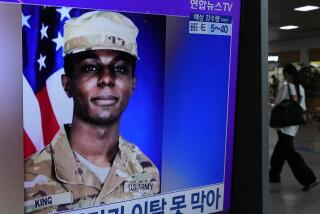For N. Korea’s Kim, the Arrest of Hussein Sends an Ominous Signal
- Share via
SEOUL — Hours after Saddam Hussein’s capture became public, a Korean American political activist dashed off a congratulatory e-mail to President Bush offering advice.
“I must remind you that there is another evil dictator in North Korea who is much worse than Saddam Hussein. His name is Kim Jong Il.... He has to be tried and captured NOW!!” wrote Sin-U Nam, a prolific critic of the North Korean regime, in the letter later made public.
Bush has said that the United States has no plans to depose Kim. At his news conference Monday, Bush repeated that North Korea will be handled differently from Iraq because Hussein represented a unique threat the world had been unable to resolve for 12 years.
Saying he was reluctant to use force, Bush praised the ongoing diplomatic efforts to create a nuclear-free Korean peninsula.
“We’re now co-participants in the process of convincing Kim Jong Il to change his ways,” he said. “And that’s exactly where we are in the process, and I’m pleased with the progress we’re making. And I hope, of course, he listens.”
Yet Hussein’s capture is certain to be viewed as an ominous development by the North Korean government. It will embolden U.S. hard-liners who want the administration to push for regime change in the communist country, where the Kim family has ruled for more than half a century. And the arrest will strengthen the U.S. position in six-party talks aimed at persuading North Korea to dismantle its nuclear weapons program.
“The image of Saddam Hussein hiding like a rat in a hole in the ground has got to have a powerful psychological effect on Kim Jong Il,” said one American analyst, who asked not to be named.
A standoff over the country’s atomic arms has been percolating for more than a year. North Korea has expelled United Nations weapons inspectors, cranked up an old nuclear reactor and begun extracting weapons-grade plutonium, while publicly challenging the United States. The regime in Pyongyang may have assumed that Washington was so beleaguered in Iraq it would be negotiating with a weak hand.
“The North Koreans must be really shocked,” said Kim Tae Woo, a diplomatic analyst with the Korea Institute for Defense Analyses in Seoul. “This will make the U.S. much freer and stronger in its dealings with North Korea. And this will highlight the direct threat that the North Korean leadership feels from U.S. military power.”
In Washington on Monday, State Department spokesman Richard Boucher said the U.S. and China had determined that the talks would not resume this year but hoped the next round would take place early in 2004.
He said the United States was still calling for the North Koreans to “drop their preconditions for talks.”
North Korea has been described by Bush as part of an “axis of evil,” along with Iraq and Iran.
“The North Koreans will be more convinced than ever that the Bush administration is out to get them,” said Lee Chung Min, an international relations specialist with Yonsei University in Seoul.
At the beginning of the U.S.-led war in Iraq, Kim Jong Il vanished from public view for more than six weeks, prompting speculation that he was hiding in a bunker for fear of assassination. But the North Koreans have been more confident in recent months and have increased their demands, asking for humanitarian aid, the lifting of economic sanctions and energy assistance as preconditions for talks.
Diplomatic analysts are divided on whether the arrest of Hussein will make North Korea a more compliant negotiator. The North Koreans have said repeatedly that the lesson they learned from Iraq was to keep their nuclear weapons as a deterrent to U.S. aggression.
In a commentary published Monday in Rodong Shinmun, an official newspaper, Pyongyang threatened to strengthen its “nuclear deterrent force” if the United States didn’t issue a written guarantee that it would not attack.
There was no official reaction to Hussein’s capture.
More to Read
Sign up for Essential California
The most important California stories and recommendations in your inbox every morning.
You may occasionally receive promotional content from the Los Angeles Times.











